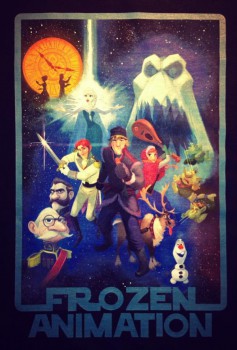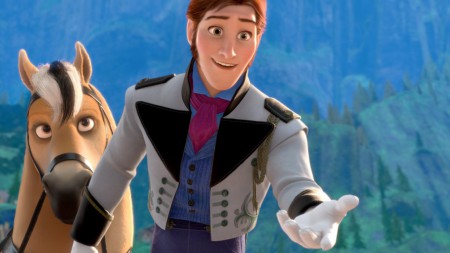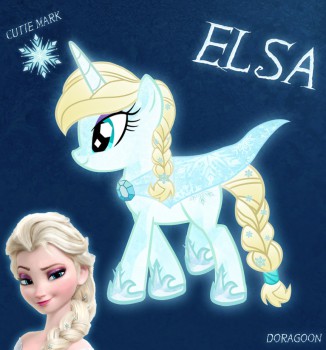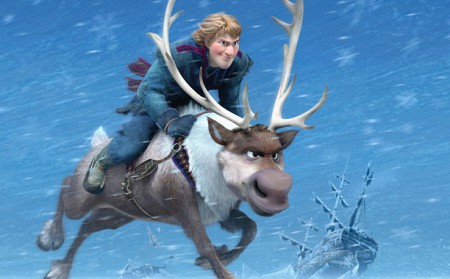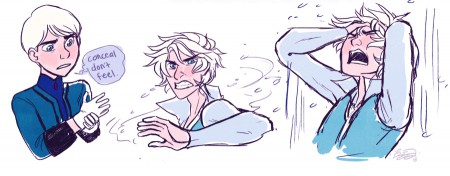Frobros – An Analysis of Why Men Love ‘Frozen’
Much of its success has been attributed to the music, in particular the Oscar nominated song "Let It Go," which has been a top seller on the Billboard charts and has returned the soundtrack back to the number one spot yet again. But it is obvious that these sales aren't limited to parents buying it for their kids and albums rarely achieve these sales figures without appealing to both sexes. So I decided to explore a seldom talked about phenomena - the men who love Frozen.
The media has recently brought Bronies into mainstream attention. For the unfamiliar, they are the legion of men who are fanatics over Hasbro's television series, My Little Pony: Friendship is Magic. The existence of grown men who have formed a community over that show has delighted talk show hosts and made them the punchline of many jokes. Series creator Lauren Faust, who is currently producing Wander Over Yonder on Disney Channel, is delighted by the unexpected fan base for the series and has brought up a valid point. Her series is about a group of six girls who display great values and do awesome things. What does it say about our society that it denies such a show from appealing to anybody other than little girls?Within the accepting safety of Brony culture, there has been an obsession with Frozen, but the number of men interested in Frozen is significantly greater than the number of Bronies, assisting Disney's film in becoming a titanic hit about two sisters trying to understand each other. Since its debut last November, not a single day has gone by where my Facebook news feed hasn't featured a friend either mentioning or sharing an article about Frozen. To my surprise, it is not uncommon to see these posts from heterosexual men. What is it about Frozen that has crossed the gender lines that would traditionally have defined its appeal almost exclusively to women and children?
(artwork by Doragoon)
While men are seldom as over-the-top manly as Gaston, there are societal expectations for men to to be tough, strong and unemotional. "Be a Man" is not just a catchy song from Mulan, but an expression often used when men are deviating from the spectrum of what society deems "manly." Other expressions, such as "man up" or "grow a pair," imply that a man is not a man if he doesn't bestow these qualities. The diversity of the male characters in Frozen represent many definitions of "manly." There are the Über manly-men in the background, such as the ice breakers and palace guards. These nameless men are strong, tough, and sing bass. Hans, the prince from the Southern Isles, is a representation of most girls' dream guy, at least when first introduced. He's your typical handsome prince charming, with a personality that can make you laugh and fall in love instantly. Kristoff is also a fairly typical manly-man. He is sloppy, has bad hygiene, and doesn't care about appearances. However he is much more in touch with his emotions, aka he is in touch with his "feminine side."It is not the men of Frozen that the male fans are talking about. It's Elsa, the snow queen herself, who has captured their hearts and minds. Elsa is a constrained individual who is encouraged to keep a part of who she is a secret. While this has made her universally identifiable with almost every human being on earth, I think her story also deeply connects with men. While growing up, most boys are taught not to cry, because "boys don't cry." While gender defining roles have changed considerably in recent years, most adults grew up in a time where you weren't allowed to cross certain gender lines as a boy without facing a world of mockery.
(artwork by PeachyMints)
Another core component of this unexpected interest in Frozen is the relationship between Anna and Elsa, two estranged sisters who barely communicate. The way society often molds young men leads to a belief that showing your emotions or sharing your feelings makes you weak, or "unmanly." The typical relationship between men and their friends are solely interest based, whereas women tend to be more open about their relationships and feelings. The evolution of Anna and Elsa's sisterhood leads to a place of mutual understanding and closeness that most men lack in their friendships or even relationships with their siblings.These hypotheses may be completely unrelated, however. Outlets like Facebook and Twitter make it easier for men to get their feelings off their chest and make it easy to share your interests that you might normally hide. After all, that's exactly how the Brony movement came into existence. However, if the men who love Frozen ever decide to form a similar community, please... I beg of you... call yourselves Frobros. I'll see y'all at Frobro-Con 2014!

